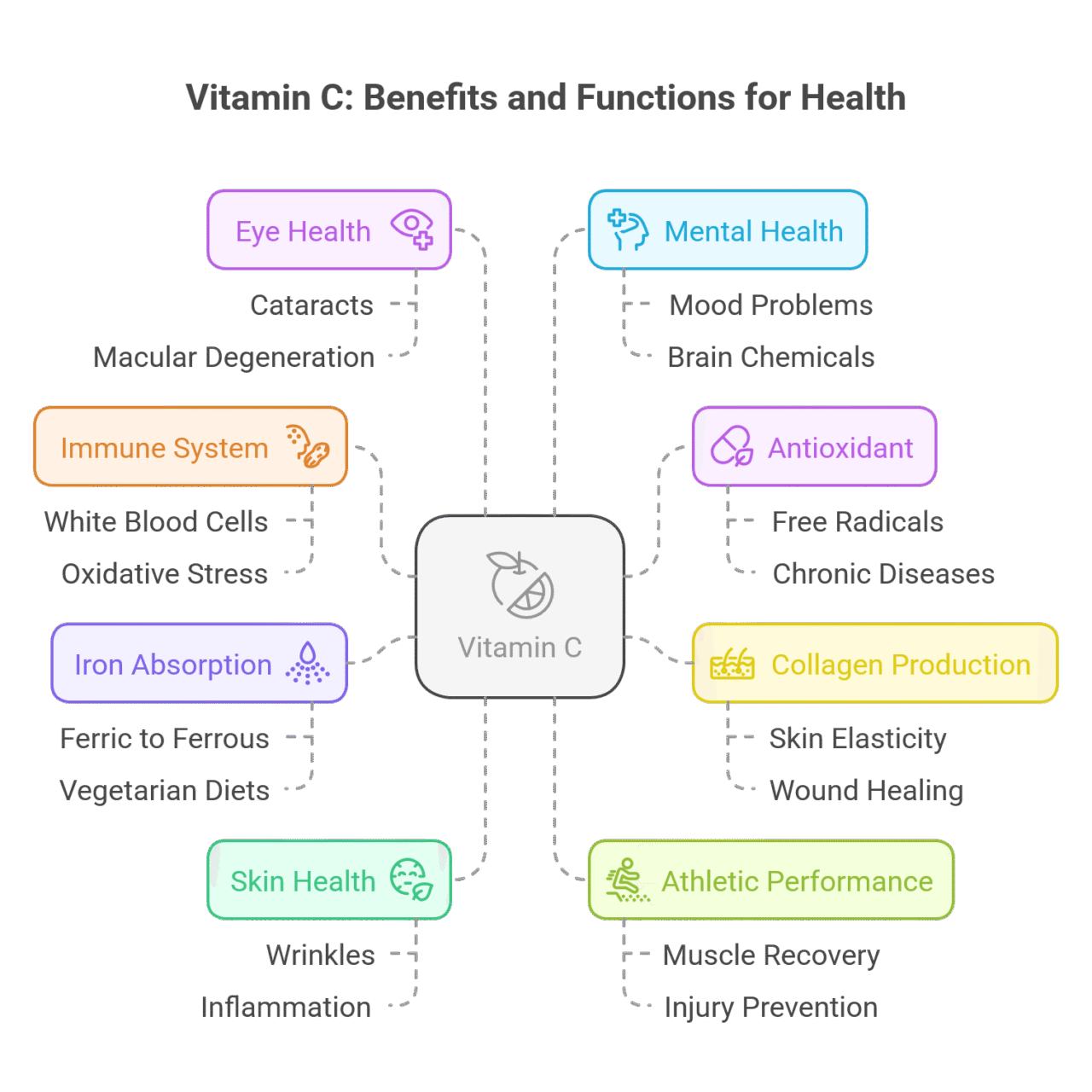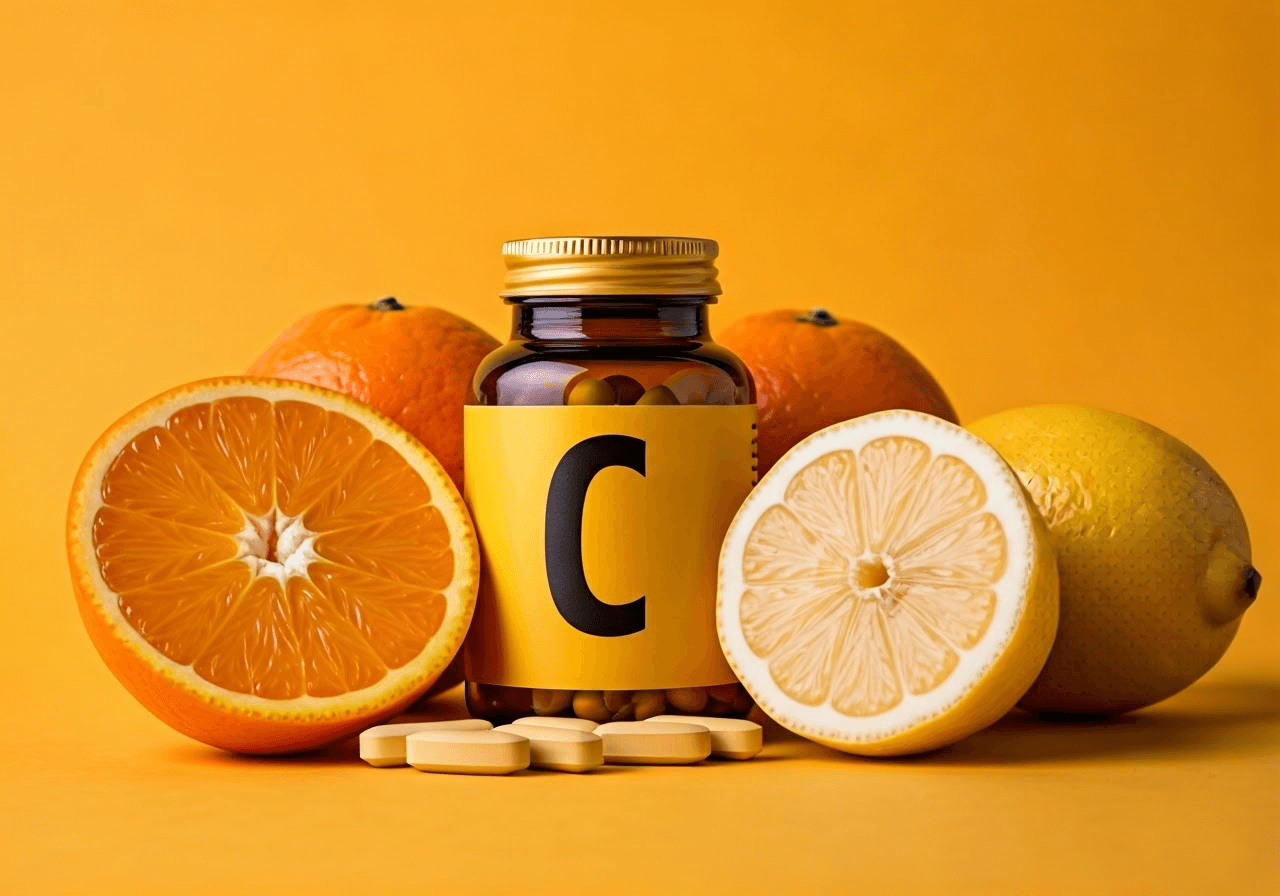
Vitamin C is a very important nutrient for good health. It helps support your health, keeps your skin looking good, and acts as a strong shield against damage. If you want to boost your health, improve your skin, or make sure you get enough vitamins, it’s important to learn about the benefits, best sources, daily amounts, and side effects of vitamin C. In this guide, we will go over everything about vitamin C. This includes how to get enough from food and supplements, who needs more, and how to choose the right type for your needs.
Vitamin C Benefits and Key Functions for Health

Vitamin C, also known as ascorbic acid, is essential for our body functions. We can’t produce it ourselves, so we must obtain it from food or supplements. This vitamin acts as an antioxidant, supporting overall health by boosting immunity and aiding collagen production. Its advantages extend beyond preventing colds.
Let’s look closer at the amazing functions of vitamin C and see why it is important for good health and well-being.
How Vitamin C Supports Immune System & Fights Infections
Vitamin C is famous for helping the immune system. It aids many cell functions in both the innate and adaptive immune systems. As an antioxidant, vitamin C helps protect the body from oxidative stress, which can weaken the immune system. Studies show that vitamin C supplementation can improve how different immune cells work, especially white blood cells, which are critical in fighting infections.
Even though vitamin C may not stop the common cold, research hints that it could lessen the severity and length of symptoms, a notion supported by the ideals of Linus Pauling. More research is needed to be sure about this. Still, it’s important to keep enough vitamin C in your diet or through supplementation to support a strong immune response.
Vitamin C as an Antioxidant: Cellular Protection and Health Benefits
One big benefit of vitamin C is its strong antioxidant power. Antioxidants like vitamin C help protect our cells from damage caused by free radicals. Free radicals are unstable molecules made during metabolism. When they build up, they can harm DNA, proteins, and cell membranes, leading to oxidative stress.
Oxidative stress has been connected to several long-term health issues, like heart disease, cancer, and Alzheimer’s disease, particularly in critically ill patients. Vitamin C can neutralize free radicals, which helps lower oxidative stress. This, in turn, can reduce the risk of these chronic diseases. Recent studies have led to a systematic review indicating that by adding vitamin C-rich foods or supplements to our diet, we can protect our bodies from the bad effects of free radicals and support our overall health and wellbeing.
Vitamin C for Collagen Production, Skin Health & Wound Healing
Vitamin C is important for making collagen. Collagen is a key protein in our bodies that helps support many tissues. You can find collagen in the skin, tendons, ligaments, bones, blood vessels, and cartilage. To keep our bodies strong and healthy, we need to maintain good collagen levels. This is essential for healing wounds and keeping our skin healthy.
If we don’t get enough vitamin C, our intake of vitamin C can impact collagen production and potentially suffer. This can weaken our connective tissues and slow down wound healing, leading to skin issues. Getting enough vitamin C helps our body produce collagen properly. This supports skin elasticity, helps with wound repair, and keeps our blood vessels, bones, and other tissues strong.
Vitamin C for Iron Absorption and Deficiency Prevention
Iron is an important mineral that we need for many things. These include transporting oxygen, making energy, and creating DNA. However, it’s not always easy for our bodies to absorb iron well, especially from plant-based foods.
Vitamin C helps the body absorb iron better. It changes ferric iron, which our bodies don’t absorb well, into ferrous iron, which is easier to take in. This is great for people who follow vegetarian or vegan diets. Plant-based iron doesn’t get absorbed as well as heme iron found in animal products. If we eat vitamin C-rich foods along with meals or supplements that have iron, we can help our bodies take in and use levels of vitamin C and this important mineral much better.
Vitamin C for Skin Health: Anti-Aging and Protection
Vitamin C is important for making collagen, but it also helps with other skin health benefits. Its antioxidant qualities protect the skin from damage caused by things like the sun and pollution. This damage can cause early aging, wrinkles, and dark spots.
Vitamin C helps keep the skin looking tight and firm, which can reduce fine lines and wrinkles. It also has anti-inflammatory features that may calm conditions like acne and eczema. Some studies say that vitamin C supplementation might help keep the skin hydrated and lessen wrinkles.
Vitamin C for Athletes: Enhancing Performance and Recovery
Athletes and those who lead active lifestyles can gain advantages from vitamin C supplements due to their increased physical requirements. This vitamin is essential for collagen production, shields against harmful substances, and bolsters the immune system, making it crucial for physical performance, recovery, and injury prevention. Understanding the significance of vitamin C can assist individuals in enhancing their nutrient consumption. By protecting muscle cells from the stress-induced damage associated with intense exercise, vitamin C plays a vital role in recovery. Despite the benefits of working out, it generates more free radicals, which can result in muscle fatigue and injury. Vitamin C is particularly important after workouts; it aids in collagen synthesis necessary for repairing and rebuilding muscle tissue after exertion, while also reducing muscle soreness and inflammation resulting from rigorous exercise.
How Vitamin C Supports Eye Health and Helps Manage Diabetes
Studies show that vitamin C can lower the risk of eye problems that come with age, like cataracts and macular degeneration. , particularly in the United States. Its antioxidant properties might help protect the eyes from damage caused by UV light, which is a big risk factor for eye diseases.
Research also hints that vitamin C may help manage blood glucose levels and reduce disease risk. Although it’s not a replacement for diabetes medication, some studies suggest that vitamin C supplementation might improve how well insulin works, especially for people with type 2 diabetes.
The Link Between Vitamin C and Mental Health
New research shows that there might be a connection between vitamin C and mental health. Studies suggest that not getting enough vitamin C could increase the risk of mood problems, such as anxiety and depression. The specific reasons for this link are still being studied. Vitamin C acts as an antioxidant, and it might help with making chemicals in the brain that affect mood and thinking.
Still, we need more studies to really grasp how vitamin C deficiency relates to mental health.
Best Natural Sources of Vitamin C: Foods & Daily Intake

Vitamin C is found in many fruits and vegetables. This makes it simple to add to your diet by eating whole foods. The amount of vitamin C in food can change based on the type of food, how you cook it, and how long you keep it.
Eating different foods that are rich in vitamin C each day can help you get enough of this nutrient. It also allows you to enjoy the many health benefits vitamin C can provide.
Citrus Fruits High in Vitamin C: Oranges, Lemons & More
When you think of vitamin C, you often think of citrus fruits like oranges, grapefruits, lemons, and limes. These fruits are known for being great sources of this important nutrient. For example, a medium orange gives more than 100% of the dietary reference intakes (DRIs) of vitamin C that adults need, as detailed by the National Institutes of Health (NIH).
You can enjoy citrus fruits in many ways. Eat them fresh, drink fresh-squeezed juice, or use them in salads, smoothies, and main dishes. Squeezing some lemon or lime into your water not only makes it taste better but also adds a nice amount of vitamin C.
Berries Rich in Vitamin C: Strawberries, Raspberries & Blueberries
Berries are tasty and healthy fruits. They are full of vitamins, minerals, and antioxidants. Berries have a lot of vitamin C, which helps our overall health. Some of the best berry sources of vitamin C are strawberries, raspberries, blueberries, and cranberries.
Adding different berries to your diet can help you reach your recommended dietary allowance for vitamin C. You can enjoy these delicious fruits fresh, mix them into yogurt or oatmeal, put them in smoothies, or use them in baked recipes.
Vegetables Packed with Vitamin C: Peppers, Broccoli & Greens
Fruits are often praised for having a lot of vitamin C. However, many vegetables are also great sources of this important nutrient.
Cruciferous vegetables, such as broccoli, Brussels sprouts, and cauliflower, have a high vitamin C content.
Other good vegetable sources of vitamin C include bell peppers, especially red ones, which have more vitamin C than oranges! Leafy greens like spinach and kale, as well as potatoes cooked with their skins on, are also rich in vitamin C. The skin holds most of the vitamin C in potatoes.
Table: Best Natural Sources of Vitamin C
| Food Source | Vitamin C per 100g | Typical Serving Size | Vitamin C per Serving | Notable Benefits |
|---|---|---|---|---|
| Acerola Cherry (raw) | 1677 mg | 49 g (½ cup) | 822 mg | World’s richest source, often in powders/juices, very high in antioxidants. |
| Rose Hips (raw) | 426 mg | 50 g (½ cup) | 213 mg | Exceptionally high in vitamin C, plus antioxidants, vitamin A, fiber. |
| Guava | 228 mg | 55 g (1 medium fruit) | 125 mg | Exotic, rich in vitamin C, fiber, folate. |
| Blackcurrants | 181 mg | 56 g (½ cup) | 101 mg | Potent antioxidant, supports eye health. |
| Green Chili Peppers | 242 mg | 45 g (2 peppers) | 109 mg | Boosts metabolism, rich in capsaicin. |
| Red Bell Pepper | 128 mg | 100 g (1 medium) | 128 mg | More vitamin C than oranges; also beta-carotene, lutein. |
| Kiwi | 93 mg | 100 g (1 medium) | 93 mg | High in fiber, potassium; enhances iron absorption. |
| Raw Broccoli | 89 mg | 91 g (1 cup, chopped) | 81 mg | Fiber, vitamin K, sulforaphane. Best raw or lightly steamed. |
| Papaya | 61 mg | 140 g (1 cup, cubes) | 86 mg | Supports digestion, rich in vitamin A. |
| Strawberries | 59 mg | 152 g (1 cup, halves) | 89 mg | Anthocyanins for heart and skin health. |
| Orange | 53 mg | 131 g (1 medium) | 70 mg | Citric acid aids absorption, good for hydration. |
| Brussels Sprouts | 85 mg | 78 g (½ cup, cooked) | 66 mg | Heart health, fiber, vitamin K. |
| Grapefruit | 38 mg | 123 g (½ medium) | 47 mg | Lycopene, naringenin; may interact with medications. |
| Cabbage (raw, green) | 22 mg | 89 g (1 cup, chopped) | 20 mg | Low-calorie, supports gut health and digestion. |
| Fresh Tomatoes | 14 mg | 123 g (1 medium) | 17 mg | Lycopene, potassium. Higher in dried tomatoes. |
Types of Vitamin C Supplements: Ascorbic Acid, Mineral Ascorbates & More

Vitamin C supplements are a common choice to help people get enough vitamin C if they don’t get it from food. There are many types of vitamin C supplements. Each type has its own features, how well it gets absorbed, and the possible benefits.
It’s important to know about the different kinds of vitamin C in supplements. This helps you make smart decisions that suit your health needs and personal likes.
Ascorbic Acid: Most Common Vitamin C Supplement
Ascorbic acid is the most natural form of vitamin C and a fatty acid-related compound. It is the same type found in many foods. This form of vitamin C is easy for the body to take in and use. Because of this, ascorbic acid is a popular and cost-effective choice in vitamin C supplements. Many people prefer it.
Mineral Ascorbates: Gentle Vitamin C Options for Sensitive Stomachs
Mineral ascorbates are a form of vitamin C mixed with minerals such as sodium, calcium, or magnesium. They tend to be easier on the stomach. This makes them a good choice for people who have stomach issues with ascorbic acid.
The body absorbs mineral ascorbates just as well as ascorbic acid. This means the body can use them effectively.
Liposomal Vitamin C: Enhanced Absorption & Bioavailability
Liposomal vitamin C wraps vitamin C in small spheres known as liposomes. These liposomes are made from phospholipids, which are like the membranes of our cells. This wrapping keeps vitamin C safe from breaking down in the digestive system. It also helps the body absorb more of it.
Liposomal vitamin C is popular because it is very effective. It might send more vitamin C to our cells and tissues than regular forms.
Ester-C: Buffered Vitamin C for Better Tolerance
Ester-C is a special kind of vitamin C that has calcium ascorbate in it. It is created to be pH-neutral, which might make it easier on the stomach than ascorbic acid. People think that Ester-C can last longer in the body. This means it may keep vitamin C levels up for a longer time.
Still, more studies are needed to see if these claims are true.
Vitamin C with Bioflavonoids: Synergy for Better Absorption
Bioflavonoids are natural substances found in fruits and vegetables. They are often found together with vitamin C. People think that bioflavonoids can improve how our bodies absorb and use vitamin C better.
Some studies say that bioflavonoids may also have good effects, acting as antioxidants and reducing inflammation.
Table: Types of Vitamin C Supplements
| Type of Vitamin C | Key Characteristics | Potential Pros | Potential Cons / Considerations |
|---|---|---|---|
| Ascorbic Acid | Purest form, most researched | Cost-effective, widely available | Can be acidic for sensitive stomachs |
| Sodium Ascorbate | Buffered with sodium, less acidic | Gentler on stomach, suitable for acid sensitivity | Adds sodium — monitor if on low-sodium diet |
| Calcium Ascorbate | Buffered with calcium | Good for bone health, gentle on stomach | May increase calcium intake — not ideal for everyone |
| Magnesium Ascorbate | Buffered with magnesium | Supports muscle relaxation, may aid stress response | May not be suitable for people with magnesium sensitivity, avoid in kidney disease |
| Liposomal Vitamin C | Encapsulated in phospholipids for improved absorption | May improve bioavailability, cell-level uptake | Often more expensive, quality varies by brand |
| Ester-C® (Calcium Ascorbate + metabolites) | pH-neutral, contains vitamin C metabolites, marketed for longer retention | Gentle, potentially extended benefit | More research needed to confirm “24-hour retention” claims |
| Vitamin C with Bioflavonoids | Includes plant compounds (rutin, hesperidin, etc.) | Synergistic antioxidant effects, may boost absorption | Effectiveness of added bioflavonoids varies by product |
How to Select the Best Vitamin C Supplement

With many vitamin C supplements available, picking the right one for your needs can feel tough. You should think about several important things when choosing a vitamin C supplement. These include the type of vitamin C, how much you need, the chance of it interacting with other drugs, and your health goals.
It’s a good idea to talk to a healthcare provider. They can help you find the right dosage and type of vitamin C supplementation for you.
Best Vitamin C for Overall Wellness
Ascorbic acid, also known as vitamin C, is recommended for health and immune support. Our bodies easily absorb this nutrient, offering various health benefits. Vitamin C boosts the immune system, helps skin produce collagen, and acts as an antioxidant protecting cells from damage caused by free radicals. When choosing a supplement, go for trusted brands with clear labels for proper dosing to maximize benefits and avoid side effects. Besides boosting immunity, vitamin C improves heart health, aids iron absorption, and decreases chronic disease risk. Adding vitamin C to your daily routine enhances overall well-being and vitality.
Best Vitamin C for Gentle Digestion
Individuals with sensitive stomachs can opt for vitamin C supplements like calcium or magnesium ascorbates. These forms are easier on the stomach compared to pure ascorbic acid. Consulting a healthcare provider before adding new supplements is wise. Mineral ascorbates not only reduce stomach irritation but also offer additional benefits. Calcium ascorbate provides calcium for bone health, while magnesium ascorbate supports muscle function and relaxation. Choosing these forms of vitamin C helps in better absorption and less digestive discomfort.
Best Vitamin C for Maximum Absorption
Liposomal vitamin C is gaining popularity due to its high bioavailability, making it easily absorbed by the body. Encapsulated inThe administration of vitamin Cliposomes, this form is shielded encapsulated in liposomes shields it from degradation in the stomach, ensuring efficient delivery to cells and tissues.
Individuals can consider using liposomal vitamin C to increase their vitamin C levels. This form is pricier than traditional options. Liposomal vitamin C is known for better absorption and potential health advantages. Research indicates it improves cellular uptake, boosts antioxidants, and supports immunity. It’s favored by those aiming for optimal nutrition and wellness.
Best Vitamin C for Skin Health and Anti-Aging
Vitamin C has many benefits for health, including skin protection, immune system support, and wound healing. It fights free radicals that harm cells and cause diseases. Foods like fruits and vegetables rich in vitamin C are good for the skin. Supplements with vitamin C and vitamin E together boost their protective effects, especially for the skin. Vitamin C also improves heart health, lowers cancer risk, and enhances brain function. Taking vitamin C supplements daily along with a balanced diet can help you stay healthy and age well.
Table: Matching Vitamin C Supplements to Your Needs
| Primary Need / Goal | Recommended Supplement Type(s) | Reasoning / Why It’s a Good Fit |
|---|---|---|
| Overall Wellness | Ascorbic Acid, Ester-C | Effective, widely available, backed by research |
| Gentle Digestion / Sensitive Stomach | Calcium Ascorbate, Magnesium Ascorbate, Ester-C | Buffered forms reduce acidity and are better tolerated |
| Maximum Absorption | Liposomal Vitamin C | Designed for enhanced bioavailability and cell-level delivery |
| Skin Health & Anti-Aging | Vitamin C with Bioflavonoids, Ester-C, Topical Vitamin C | Supports collagen production, provides antioxidant synergy |
| Immune System Support | Ascorbic Acid, Liposomal Vitamin C, Bioflavonoids Combo | Promotes immune cell function and reduces oxidative stress |
| Stress & Muscle Support | Magnesium Ascorbate | Provides both vitamin C and magnesium — helpful for relaxation |
| Plant-Based / Natural Preference | Vitamin C with Bioflavonoids (from citrus or acerola) | Plant-derived compounds with added antioxidant benefits |
| Kid-Friendly / For Children | Chewable, Gummies, Liquid Vitamin C | Easy to take, child-friendly dosages and flavors, gentle |
| Travel & Immune Boost on the Go | Effervescent Tablets, Powders, Liposomal Packets | Convenient, portable, fast absorption for busy lifestyles |
| Vegan / Allergen-Free | Plant-based Vitamin C (Acerola, Camu Camu, Certified Vegan brands) | Free from animal products and allergens |
| Budget / Affordable Option | Ascorbic Acid Tablets or Powder | Cost-effective, easy to find, simple dosing |
| Bone Health | Calcium Ascorbate | Combines vitamin C with calcium for dual support |
History and Evolution of Vitamin C Supplementation

The way we understand and use vitamin C has changed a lot over time. Its history is linked to the discovery and treatment of scurvy, which happens when there is not enough vitamin C. From old remedies to today’s supplements, the growth of vitamin C supplementation shows how science and nutrition have improved.
Looking at the history of vitamin C supplementation helps us see why it is important and why research on it continues to grow.
From Ancient Vitamin C Remedies to Modern-Day Supplements
People have used foods high in vitamin C for health reasons for many years. Ancient cultures knew that eating fruits and vegetables could help keep them healthy and fix some health problems. Still, it wasn’t until the 1700s that people found out that citrus fruits could help stop scurvy.
Navigating the Market: Choosing High-Quality Vitamin C Supplements
When choosing a vitamin C supplement, don’t just focus on the label. There are many types, brands, and claims available. Understanding how to check for quality can help you make a safer and better choice.
When you want the best way to get nutrients, a vegan choice, or something easy on your stomach, there are a few important things that can help you decide.
Use the table below to quickly check important things to compare when picking a good vitamin C supplement:
| Factor | What to Look For | Why It Matters |
|---|---|---|
| Form | Ascorbic Acid, Mineral Ascorbates, Liposomal, Ester-C, etc. | Different forms vary in absorption, tolerance, and price. |
| Dosage | Clearly labeled, matches daily needs (typically 250–1000 mg) | Avoids under- or overdosing; ensures effective supplementation. |
| Supplement Format | Tablets, Capsules, Powders, Gummies, Liquids, Effervescent forms | Impacts convenience, absorption speed, and user preference. |
| Quality | Third-party testing, certifications (USP, NSF, GMP) | Verifies purity, potency, and safety of the product. |
| Ingredients | Minimal fillers, no unnecessary additives or allergens | Reduces risk of side effects or allergic reactions. |
| Bioavailability | Enhanced forms (e.g., liposomal, with bioflavonoids) | Improves absorption and utilization by the body. |
| Brand Reputation | Trusted manufacturers, positive reviews, transparency | Increases confidence in safety and efficacy. |
| Price & Value | Cost per serving, size of bottle, return policy | Balances budget with quality; ensures cost-effectiveness. |
| Storage & Shelf Life | Stable packaging, clear expiration date | Maintains potency and prevents spoilage. |
| Vegan/Allergen-Free | Plant-based, non-GMO, allergen statements | Suitable for dietary restrictions or sensitivities. |
Special Populations and Vitamin C: Tailoring Your Intake

Some life stages and health conditions may need changes in vitamin C intake. Pregnant women, breastfeeding moms, babies, children, older adults, and people with specific health issues might need different amounts of vitamin C to suit their needs.
It’s important to think about factors like age, health, and lifestyle when figuring out the right amount of vitamin C for these groups.
Vitamin C Needs During Pregnancy and Lactation
During pregnancy and breastfeeding, women need more nutrients to help their growing baby. Vitamin C is important for making collagen, supporting the immune system, and ensuring healthy development of the fetus.
Adjusting Vitamin C Intake for the Elderly and Children
As children grow and develop, they need more vitamin C. This vitamin helps their bodies grow quickly, strengthens their immune systems, and helps them absorb iron. Older adults should also be mindful of how much vitamin C they consume.
Table: Vitamin C Intake Guidelines for Special Populations
| Population Group | Recommended Daily Intake (RDI)¹ | Why Vitamin C Is Important | Considerations / Notes |
|---|---|---|---|
| Pregnant Women | 85 mg | Supports fetal development, immune system, and collagen formation | Avoid high-dose supplements (over 2,000 mg/day) unless advised by a doctor |
| Breastfeeding Women | 120 mg | Helps replenish maternal stores, supports milk quality and baby’s health | Vitamin C is transferred through breast milk |
| Infants (0–12 months) | 40–50 mg (adequate intake) | Supports immune defense and tissue growth | Intake should come from breast milk or formula unless otherwise advised |
| Children (1–8 years) | 15–25 mg | Essential for growth, immunity, and iron absorption | Balanced diet is typically sufficient; avoid high-dose supplements |
| Older Children (9–13) | 45 mg | Supports development and protects from oxidative stress | May need more during illness or poor dietary intake |
| Teens (14–18 years) | 65–75 mg | Helps with immune system and iron metabolism during puberty | RDI varies by sex; upper limit: 1,800 mg/day |
| Older Adults (19+) | 75–90 mg | Supports aging tissues, immune function, and antioxidant protection | May need more if absorption is reduced or diet is limited; upper limit: 2,000 mg/day |
| People with Health Conditions | Varies (consult provider) | May have higher needs due to inflammation, poor absorption, or oxidative stress | Those with smoking, infections, or chronic illness may require more |
¹ Based on NIH Recommended Dietary Allowances (RDA) for Vitamin C
Note: Always consult with a healthcare professional before adjusting intake, especially during pregnancy, illness, medication use, or for children.
Debunking Vitamin C Myths: Separating Fact from Fiction

Even though vitamin C has many known benefits, there is a lot of wrong information that causes confusion and misunderstandings. It’s important to know the facts that are supported by science and to ignore claims that are not based on evidence.
Clearing up common myths will help people make smart decisions about how much vitamin C they should have.
Addressing Common Misconceptions About Vitamin C
Many people believe that vitamin C can cure the common cold. While it does help the immune system, it does not guarantee a cure for colds. Another myth is that taking more vitamin C is always better.
The Truth Behind Mega-Dosing: When More Isn’t Better
Vitamin C is mostly safe, but taking too much can cause problems, including an increased risk of kidney stones. When you go over the upper intake level, especially with large doses of vitamin C from supplements, you might face side effects. Large doses can result in digestive issues, such as diarrhea, nausea, and stomach cramps. It’s important to stick to the daily intake recommendations.
Here are some of the most common myths about vitamin C — and what science actually says about them:
| Myth | Scientific Fact |
|---|---|
| Vitamin C cures the common cold | May reduce the severity or duration, but does not cure or prevent colds. |
| The more vitamin C you take, the better | The body only absorbs a limited amount; excess is excreted. Large doses can cause side effects and health risks. |
| Only citrus fruits are rich in vitamin C | Many fruits and vegetables (bell peppers, kiwi, broccoli, strawberries) have more vitamin C than oranges. |
| Vitamin C supplements are always “natural” | Most supplements are synthetic ascorbic acid, but they are chemically identical to natural forms and equally effective. |
| Vitamin C prevents or cures cancer | No solid evidence; ongoing research for high-dose IV vitamin C, but not a standard treatment. |
| Vitamin C alone prevents skin aging | Supports skin health and collagen, but does not prevent aging or wrinkles on its own. |
| Vitamin C boosts energy levels | It is not a stimulant. Only helps prevent fatigue if you are deficient. |
| You must take vitamin C every single day | The body keeps small reserves; missing a day is not harmful for most healthy adults. |
Always rely on evidence-based information when making health decisions about vitamin C or any supplement.
Revolutionary Findings: Latest Research on Vitamin C
New research is showing that vitamin C might have helpful benefits for treating and preventing diseases. Recent studies are looking into how vitamin C affects different health problems, like cancer, cardiovascular disease, heart disease, and brain decline as we age.
These important studies show that there is still a lot to discover about the amazing effects of vitamin C and how it could help people’s health.
Cutting-Edge Studies on Vitamin C and Cancer Prevention
Research on how vitamin C can help prevent cancer risk, including breast cancer, is still new, but some studies look hopeful. High doses of vitamin C might have effects that fight cancer in laboratory and animal tests. Still, we need more studies, especially with people, to really know how well it works.
Vitamin C’s Impact on Heart Health and Blood Pressure Regulation
Vitamin C plays a complex role in heart health, particularly in maintaining plasma ascorbic acid levels and in understanding the effect of intravenous vitamin C on cardiovascular health. Some research shows that getting enough vitamin C might help keep blood pressure levels healthy. However, other studies do not find a strong link between vitamin C supplementation and a lower risk of heart disease in people who do not have existing deficiencies.
Conclusion
Vitamin C has many benefits besides just helping your immune system. It also boosts collagen production and supports skin health. You should add natural sources like citrus fruits and vegetables to your diet. If you think about taking supplements, choose the ones that fit your needs, whether for overall wellness or for skin health. Keep yourself informed about new research on Vitamin C, like how it may help with cancer prevention and heart health. By learning about its various benefits and picking the right supplements, you can use Vitamin C to improve your overall well-being.
The content on WellwayHub.com is intended for general informational purposes only and should not be taken as medical advice. Please consult your doctor or a qualified health professional before making any changes to your health routine.
Some links on WellwayHub.com may be affiliate links. This means we may earn a small commission if you make a purchase through these links, at no extra cost to you. This helps support our mission to provide trusted wellness content.
Frequently Asked Questions
Yes. Vitamin C mixes well with water and the body does not keep it for long. It is a good idea to take it daily through food or supplements. This helps your immune system, supports collagen production, and protects against cell damage.
The NIH says that the Recommended Dietary Allowance (RDA) is 90 mg per day for adult men and 75 mg per day for adult women. A person's needs go up during pregnancy (85 mg per day) and breastfeeding (120 mg per day). The highest safe limit for adults is 2,000 mg per day.
Yes. Taking more than 2,000 mg of vitamin C each day can lead to side effects like diarrhea, stomach aches, and feel sick. It can also raise the chance of getting kidney stones, especially in those who already have them. Most people do not need such high doses.
High doses can cause stomach issues. They may also affect some lab tests and raise oxalate levels. This might lead to kidney stones.
Common symptoms are tiredness, bruising easily, bleeding gums, slow healing wounds, and dry or rough skin. In serious cases, it can lead to joint pain, a blood issue, and gum disease.
Get more vitamin C by eating foods like citrus fruits, bell peppers, strawberries, broccoli, and kiwi. If your case is more serious, a doctor may suggest temporary supplements for you to take with guidance.
No. While supplements can help you get enough vitamin C, they do not give you fiber, phytonutrients, or the many antioxidants and vitamins that are in whole fruits and vegetables.
Top sources are red bell peppers, kiwi, strawberries, broccoli, citrus fruits like oranges and lemons, Brussels sprouts, guava, and papaya. Some of these have more vitamin C in each serving than oranges.
No. A medium banana has around 9 mg of vitamin C. This amount is low when we compare it to other fruits and vegetables.
Yes. Vitamin C helps your skin by supporting the making of collagen. It can reduce wrinkles and protect against sun damage. It also defends against environmental pollutants because of its antioxidant qualities.
Yes. Vitamin C helps the body take in non-heme iron, which comes from plant foods. This can lower the chances of having low iron levels, especially in people who are vegetarian or vegan.
Yes, it is very important during these times. The daily recommendation is 85 mg for pregnancy and 120 mg for breastfeeding. Stay away from high-dose supplements unless a doctor advises it. Always talk to your doctor before making any changes when you are pregnant or breastfeeding.